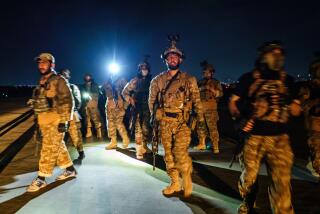Official Tacks to Mollify Afghans
- Share via
KABUL, Afghanistan — Deputy Defense Secretary Paul D. Wolfowitz came to Afghanistan on Monday to try to discourage mounting factionalism among warlords and foster the development of a national army, but instead found himself responding to sharp criticism of a recent U.S. raid that killed dozens of civilians.
The June 30 raid on several remote villages in Oruzgan province killed 48 people, mostly women and children, and injured 117, according to figures compiled by Afghan officials. The raid has drawn angry protests from the Afghan government and seems to have precipitated a number of attacks on U.S. soldiers.
While acknowledging that civilians were killed, Wolfowitz oscillated between a defense of the raid, which he made when speaking at a U.S. air base in the morning, and more nuanced comments, made later in Kabul, the capital.
“We are always concerned when we believe we may have killed innocent people, and we think that happened and we regret that,” he said at Bagram air base. But, he added, “we have no regrets about going in after bad guys, and there were some there.”
However, at a news conference at the presidential palace with Afghan Foreign Minister Abdullah, Wolfowitz suggested that the military would try to make some changes demanded by Afghan authorities.
“It is very important to us to work with Afghan authorities on both a local and national level to make sure our operations are coordinated and they proceed in a way that contributes to the long-term stability of this country,” he said. “When we have made a mistake or think we may have made a mistake, as in Oruzgan, we will try to track down as thoroughly as we can the causes of it to try and prevent it.”
Wolfowitz offered no specifics on how the U.S. might alter its approach to avoid such errors and said that even with added vigilance, there are no guarantees that such a tragedy would never happen again.
At a news briefing Monday, Pentagon spokeswoman Victoria Clarke said that the U.S. has been coordinating with local Afghans, noting that there were some Afghan forces on the ground during the Oruzgan raid operating with U.S. troops. However, she said she had no details as to who they were or to whom they reported.
Wolfowitz’s visit comes at a critical moment in the new Afghan government’s effort to exert its influence over the unsteady nation. Many areas of the country remain under the influence of regional warlords, and because there is no national army, the government of President Hamid Karzai has no way to enforce its policies.
U.S. officials believe the answer is to create a multiethnic army that would be loyal to the central government. But initial efforts to train such a force have been fraught with difficulty. Members of different ethnic groups are sometimes wary of working together and taking orders from one another. Furthermore, unless regional warlords disband their militias and support the national army, it will have little clout in areas where warlords’ forces remain active.
“The goal is to stabilize the country, to bring security to the country,” Wolfowitz said. “That’s going to require some kind of balance between central government and local leaders; clearly the central government is still very weak.”
In an effort to help Karzai’s government in one of its biggest trouble spots, Wolfowitz traveled Monday afternoon to the northern city of Mazar-i-Sharif, where there have been repeated outbursts of fighting between the militias of three warlords from different ethnic groups. Wolfowitz met with two of the chiefs--Abdul Rashid Dostum, an Uzbek, and Haji Mohammed Mukhaqiq, a Hazara--and reminded them that if fighting does not stop, Western aid groups and nongovernmental organizations will halt their efforts to supply the area with food, shelter and other items.
“Even these tough generals care about their people,” Wolfowitz said, adding that the key to lasting security is a national army and money for rebuilding and development. “It is very important for the security ... to make good on the promises the world has made.”
If people have shelter, food and employment, there will be less desire to take up arms, he said.
More to Read
Sign up for Essential California
The most important California stories and recommendations in your inbox every morning.
You may occasionally receive promotional content from the Los Angeles Times.













